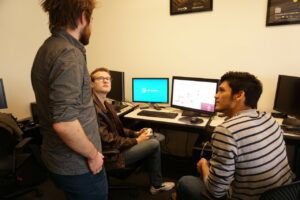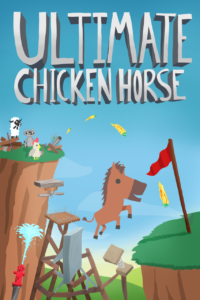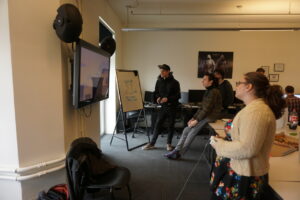What does it take to make a good indie game? What does it take to make a successful indie game? Hundreds of hopeful, talented artists (regardless of the nature of their art) are out there asking themselves and their collaborators these questions every day. I ask myself these questions every day. Given the location of this writing, you might ask yourself these questions as well. Making videogames is cool, but making your own videogames is way cooler. It’s true.
Clever Endeavour Games is a new studio in Montreal trying to answer those questions with their upcoming game: Ultimate Chicken Horse, a game about adorable animals simultaneously designing and playing a platformer level. They have been working on the game, unpaid, for seven months. Richard (design, business) and Kyler (design, art, programming), two-thirds of Clever Endeavour, visited the Champlain Montreal campus this week for a playtesting session / pizza party. I tried to learn a little from their experiences thus far.

On the 16th they are launching a Kickstarter to finish the game and get the word out. A lot of my thoughts these days dwell on how one gets attention for one’s game. My questions followed suit. I asked Richard how they plan on getting noticed. His answer was like a shotgun, “We’ve contacted the press before, we’ll be contacting them again for the Kickstarter launch. Social media, word of mouth, I talk to everyone.” Richard had a lot of ideas about community involvement, and he was glad to share. “Ultimately,” Richard admitted, “it has to go viral to some extent. We can’t talk to everyone. We have to hope that those who we do talk to will spread the word.”
A lot of going viral comes down to luck, but first the game has to be something that people want to talk about. Ultimate Chicken Horse is no slouch in this area. The idea is so great, when you hear it you either think, “I’ve thought of that before! Why didn’t I make that…” or “Oh my God! I can’t believe I’ve never thought of that…” On top of that, the presentation is so tight, the art so endearing. The whole package is an instant heart winner.
The proof of the pudding is in the eating, and every student at the playtest was getting their fill. Shrieks and sighs were slung across the room. The space filled with laughter. At one station competitors were developing strategy. At another, friends were trying to make levels as hilariously difficult as possible. The game is fun. It is deep and it is wide. I asked Richard and Kyler how quickly they knew the idea was good. “The first weekend,” they harmonized, “we worked on it at a game jam and immediately knew the idea was good. It was rough, of course, but even in that form we could feel the fun and see the potential.”
As the playtest wrapped up, I asked Richard and Kyler for their Top Tips™ for aspiring indie developers or upcoming game developers in general. “Talk to everybody.“ Richard began, “It’s really surprising how nice everyone is. People want to help, people want to talk about their work, people want to be involved. Get involved with the community and talk to everybody. You have to be able to get out there and talk about your game and make a fool of yourself.” Kyler seconded that, “And if you aren’t the kind of person to do that, you have to get a Richard of your own. Beyond that, do you know Git or some other version control? Use it, learn it, master it. Use it for everything.”

